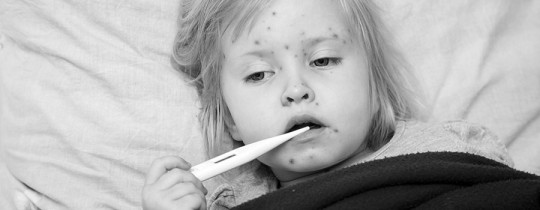Measles

Description
Measles is a highly contagious infection of the respiratory system. It was once a very common childhood infection in North America. In fact, in the early 1960s, at least half a million children were infected with measles every year. This eventually stopped in 1963 when the measles vaccine was created. Measles spreads through respiration, and it is so contagious that 90% of people who haven’t had measles or do not have the vaccine and who share some kind of living space with an infected person will catch it. Despite the fact that a safe vaccine is available, measles remains as one of the leading causes of death among young children today. More than 95% of these deaths occur in third world countries with poor health infrastructures, and in 2011, measles caused 158 000 deaths worldwide. PubMed Health which is part of the A.D.A.M. Medical Encyclopaedia provides a detailed description of various symptoms, treatment, and possible risks/complications.
Symptoms
Measles begins with an incubation period, which occurs for about 1-2 weeks after the initial infection without causing any symptoms. After the incubation period ends, initial symptoms will begin to appear. This includes red eyes, a runny nose, cough and fever. Around two days later, Koplik’s spots (small, red, irregular spots with a bluish or whitish center) will develop near the molars inside the cheeks. Approximately two days after this happens, the classic measles’ rash develops. The rash will begin to fade within 5 days. The rash typically does not itch and isn’t painful. It changes colour from red to dark brown before disappearing, which is referred to as staining. It can last up to eight days before it fully disappears. It begins on the back of the ears before spreading to the head and neck in only a few hours, eventually covering the entire body. The worst part of the measles is the fever, which can reach up to as high as 104 degrees. The fever lasts around four days and is accompanied by the 3 Cs: conjunctivitis (red eyes), coryza (head cold), and cough.
Causes
Measles is caused by a virus called paramyxovirus, which of the genus Morbillivirus. It is an airborne virus, which makes it highly contagious, as it is transmitted when an infected person sneezes, coughs or breathes. Humans are the natural hosts of the virus, as it is not found in animals. Those who have been vaccinated or have already had the measles infection are immune to the disease for the rest of their lives.
Prevention
The easiest way to prevent measles is by being vaccinated. In developed countries, most children are immunized by the age of 18 months. The measles vaccine is a part of the MMR vaccine combination, which vaccinates against the measles, mumps, and rubella. After the first dose, the second vaccination is given sometime between the ages of 4 and 5. Many colleges have vaccination programs in case a case of the measles breaks out in a college dormitory. In developing countries, the measles vaccine is a lot less common. For those who have the vaccine available to them, it is recommended by WHO doctors that two doses of the vaccine be given at six and nine months of age. It should also be administered regardless if the child is HIV-infected or not. Programs to provide the measles vaccination are typically used to offer and apply other child health aids in developing countries, such as vitamin A supplements and bed nets to help increase malaria protection.
Treatment
There is no specific treatment to cure measles. Most patients will recover within a week or two. Rest is an asset, and children will need to stay home from school. If the patient becomes more unwell however, seek medical advice as the patient may be developing complications. Some of these complications include pneumonia, bronchitis, and ear infections. Acetaminophen and ibuprofen can be taken to help reduce fever and pain, and if a cough is present, perhaps a fast-acting bronchodilator. For children under the age of 16, most health authorities do not recommend using aspirin for any fevers.
